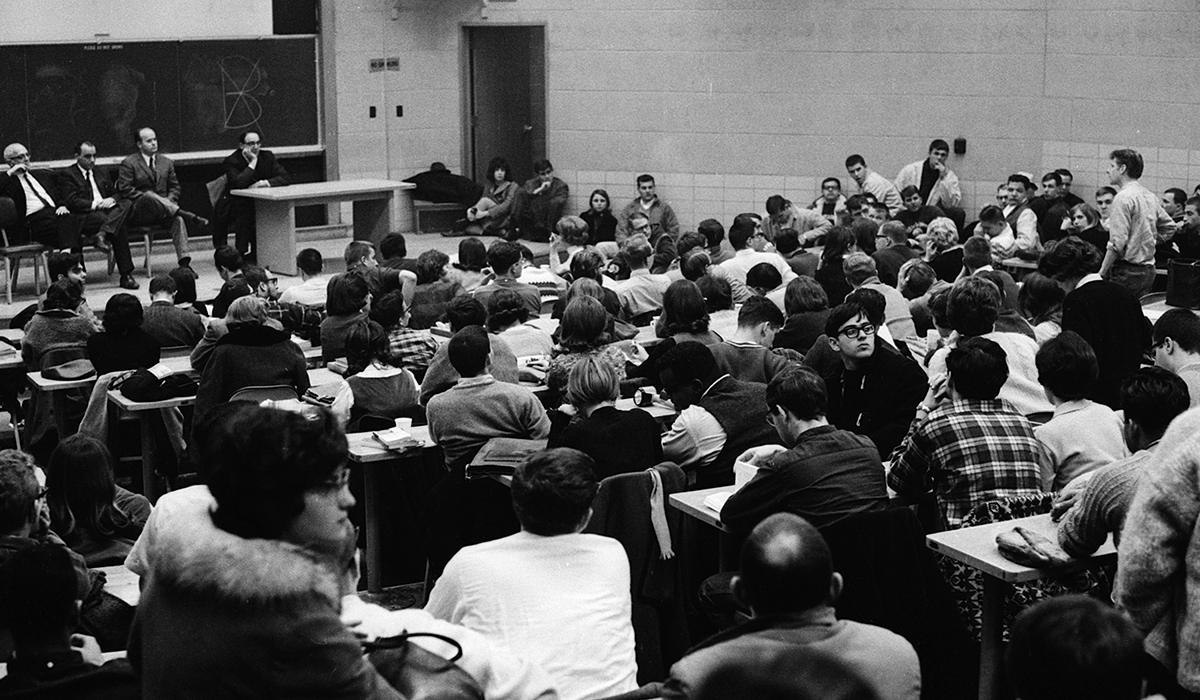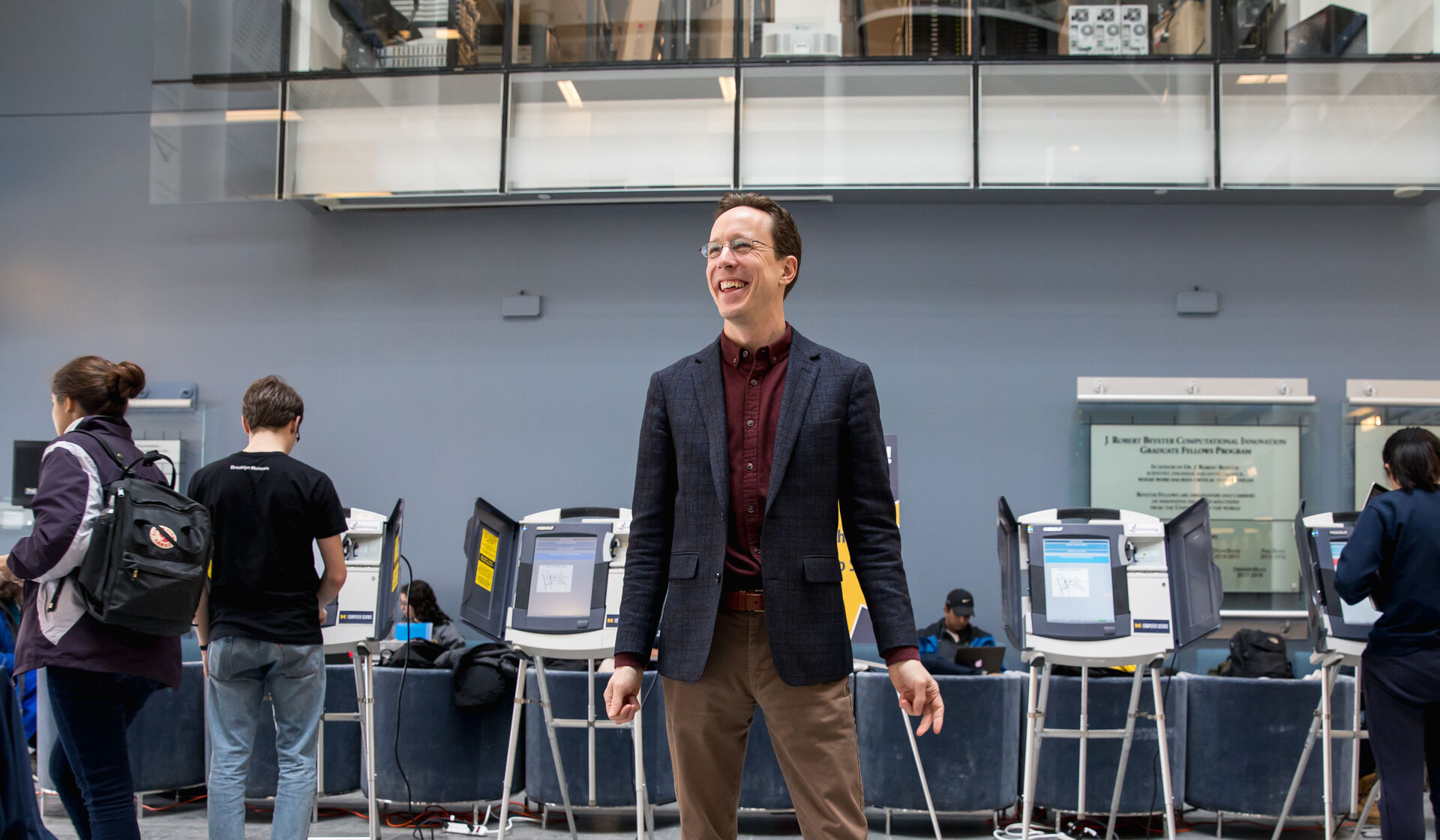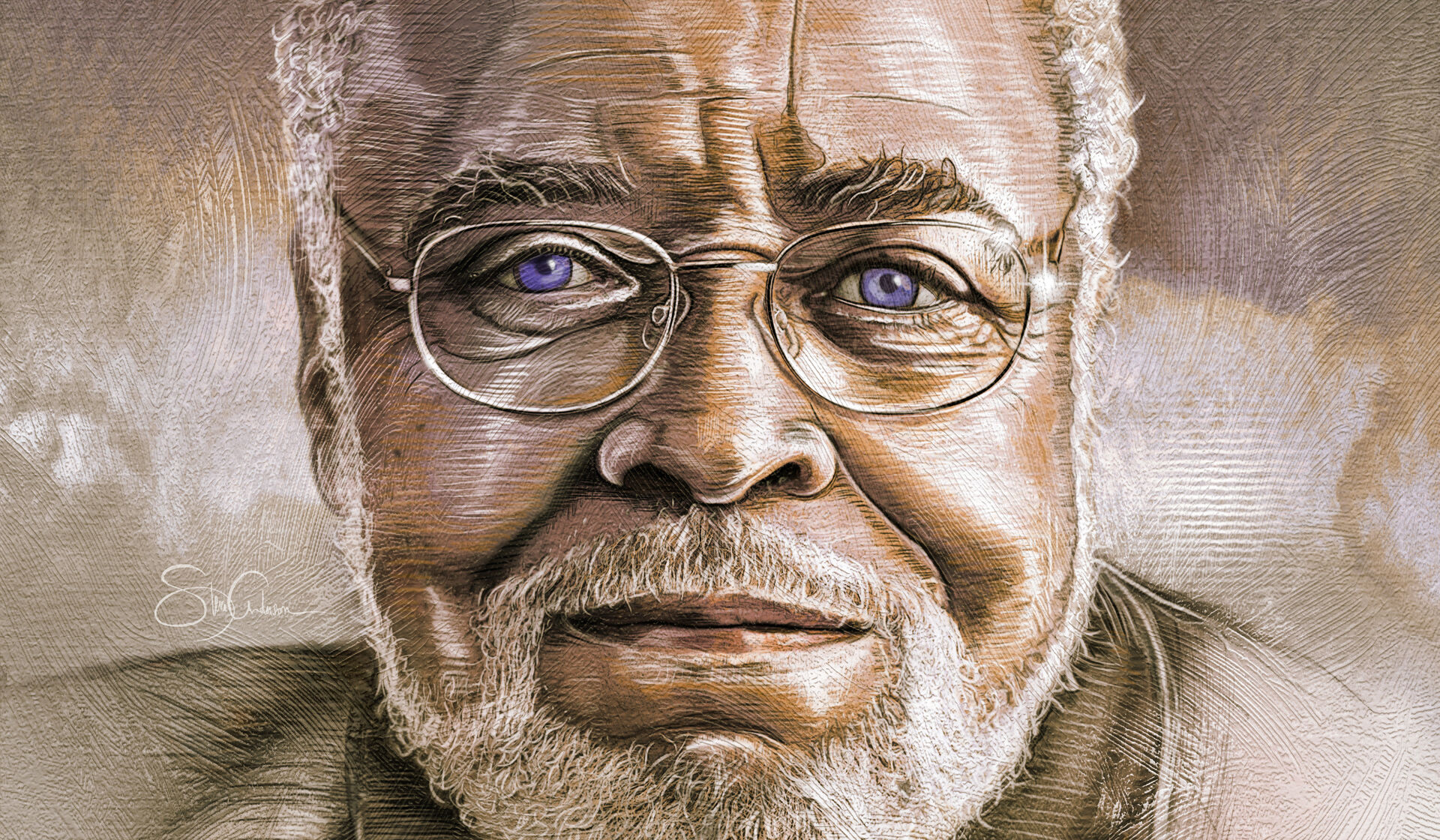As news and footage of the war in Vietnam captured more attention and garnered protest in the U.S. in early 1965, a group of U-M faculty planned to express their opposition to President Lyndon B. Johnson’s policies and escalation of the war by putting a temporary moratorium on their classes. Though the proposal was to replace their normal subjects by covering the conflict for a day, University administrators, the state government, and the pro-war segment of the public met the announcement with heavy pushback. The group pivoted to a new approach.
With approval from the University, the faculty organized the world’s first “teach-in” on the night of March 24. Around 3,000 attendees filled in four Angell Hall auditoria and the Diag, going on a 12-hour stretch from 8 p.m. to 8 a.m. with planned and informal lectures, seminars, discussion groups, and rallies around Vietnam, U.S. foreign policy, and related issues.
The protest’s success inspired similar teach-ins at other educational institutions and received a spectrum of reactions, some of which follow below.
“Three bomb scares forced evacuation of Angell Hall and an early start for the midnight Diag rally. Hecklers abounded in the crowd, like the one athlete who came dressed in an Alabama football shirt […]. A group of 75 students marched through the crowd chanting, ‘Better dead than Red.’ One sign read ‘All the Way with LBJ’ – underneath was a huge black bomb.”
— Excerpt from the March 26, 1965, edition of The Michigan Daily
“A group of University of Michigan professors protesting U.S. policy in Vietnam showed Thursday that retreat can be turned into triumph. […] The Wednesday night assembly may well have been the largest bull-session in U.S. college history and to many students, it was a living example of what a university is all about. This was no panty-raid lark. Some kooks and a handful from the left and right fringes were attracted, but for the most part, the session was peopled by students with a strong yearning to learn and an almost desperate desire to overcome helplessness with action.”
— Excerpt from the March 26, 1965, edition of The Detroit Free Press
“It turned into a nightlong debate. […] Nothing like that had been done before. It was exciting, it was important, it mattered, and people were intensely engaged. We saw that even our professors disagreed. I think it affected what courses we took, what projects we wanted to work on. For me, it was like Alice going down the rabbit hole.”
— Susan Harding, ’68, MA’71, PhD’77, in 2015, recalling attending the teach-in as a student
“[…] I do not deny these individuals their right to protest against anything but when they take into their own hands the canceling of classes for their own personal beliefs, and hence temporarily deprive their students of their right to attend such classes, this is beyond their prerogative.”
— An alum reacting to the original plan for a moratorium, Letter to the Editor, Michigan Alumnus, April 1965
“In the April issue of the Alumnus there was an article […] that greatly disturbed me and I imagine a great many more alumni who served (as I did) and had sons in the armed forces in World War II.
“I can readily see how University students might think it wise to ‘give in’ to the Communists but, for the life of me, I can’t understand how a great University, like Michigan, would have professors who would be willing to ‘sell us down the river.’ Have they forgotten how many pledges, treaties, etc. the Communists have ‘signed’ and, then broken after we had been ‘Lulled to sleep’?
“[…] I thank the good Lord that we have a President who is not being hoodwinked and has the intestinal fortitude to stop the spread of Communism. I have been a Republican all my life but I am 100 percent in favor of President Johnson’s stand.”
— An alum expressing their pro-Vietnam War stance, Letter to the Editor, Michigan Alumnus, May 1965
“Since the imperative need of ‘Peace’ has become the concern of every living human being, we desire to commend the Michigan Alumnus for the notice […] of the University of Michigan ‘Teach-In.’
“It is a credit to both the student body and the professional and instructor persons constituting the current University that the imperative need of world-wide ‘Peace’ is to them a vital concern.”
— An alum expressing their pro-peace stance, Letter to the Editor, Michigan Alumnus, June 1965
“[…] The big bait for many to the ‘teach-in’ was the fact that one had permission to be out of the dormitory until 8 a.m. This, to some realistic students, was a good excuse to attend the unrealistic ‘teach-in.’ It has become affectionally called by many of them a ‘sleep-out.’ This was true, becoming more so as the speakers droned on.”
— A self-professed “in-law” of the University and Ann Arbor resident, Letter to the Editor, Michigan Alumnus, September 1965
“I don’t know the statistics, but all of a sudden, there were teach-ins happening everywhere. Berkeley put on a huge two-day spectacle, which drew thousands of people. Very quickly, with so many faculty taking part, it became clear that the anti-war movement was not simply a student movement.”
— Todd Gitlin, MA’66, an attendee to the teach-in, recalling its impact in 2015
For more on the story of the first teach-in, read “Teach Your Children Well” from the Spring 2015 issue of Michigan Alumnus.
Gregory Lucas-Myers, ’10, is the senior assistant editor of Michigan Alum.





